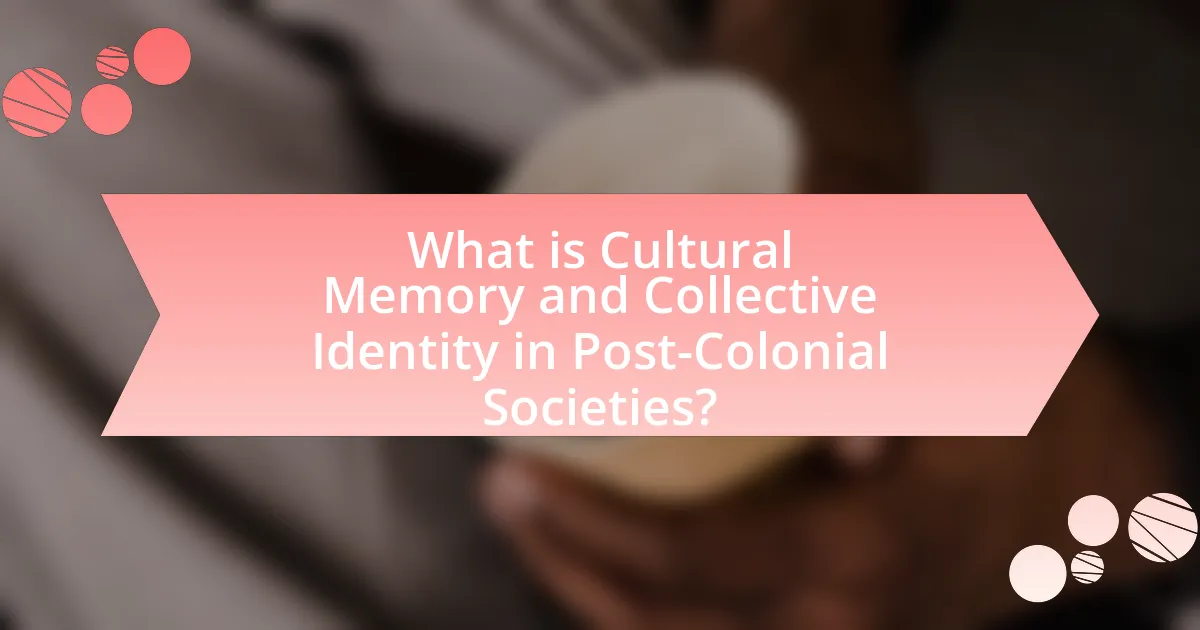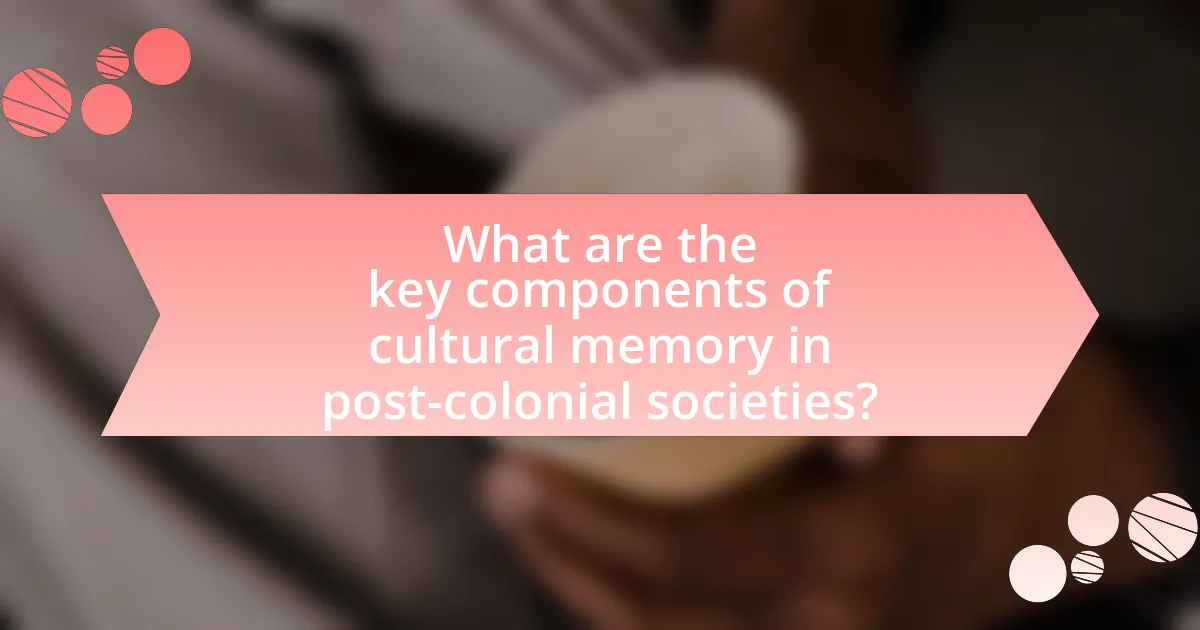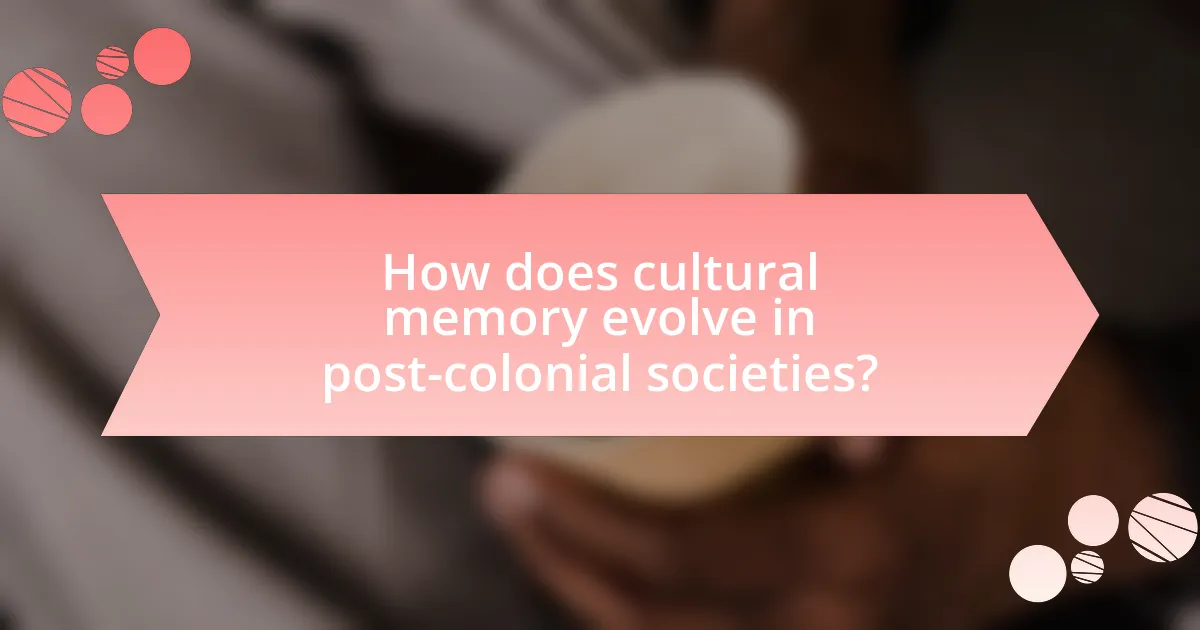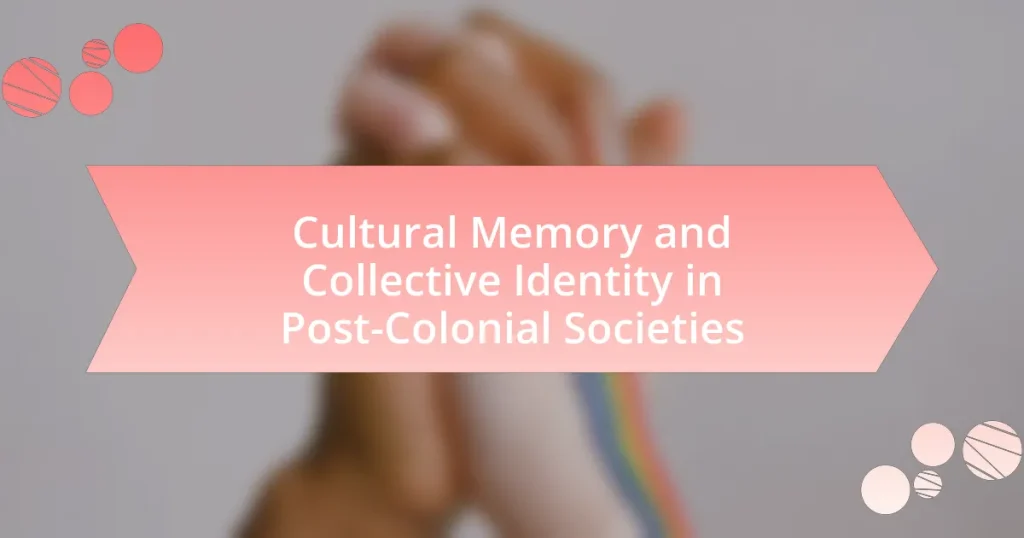Cultural memory and collective identity are pivotal concepts in post-colonial societies, reflecting how shared recollections and narratives shape community identities and historical consciousness. This article explores the interaction between cultural memory and collective identity, emphasizing their roles in social cohesion and empowerment, particularly in response to colonial legacies. It examines how historical context influences cultural memory, the emergence of collective identity from shared experiences, and the impact of narratives, symbols, and rituals in reinforcing group identity. Additionally, the article discusses the evolution of cultural memory over time, the effects of historical injustices, and practical strategies for preserving cultural memory within educational systems and community initiatives.

What is Cultural Memory and Collective Identity in Post-Colonial Societies?
Cultural memory in post-colonial societies refers to the shared recollections and narratives that shape a community’s identity and historical consciousness, often influenced by colonial experiences. Collective identity in these contexts emerges from the interplay of cultural memory, as groups reconstruct their identities in response to colonial legacies, asserting their uniqueness and resilience. For instance, the African National Congress in South Africa utilized cultural memory to foster a collective identity during the anti-apartheid struggle, drawing on historical events and shared experiences to unite diverse groups against colonial oppression. This process highlights how cultural memory and collective identity are crucial for social cohesion and empowerment in post-colonial contexts.
How do cultural memory and collective identity interact in these societies?
Cultural memory and collective identity interact in post-colonial societies by shaping the narratives that define group belonging and historical consciousness. In these societies, cultural memory serves as a repository of shared experiences, histories, and traditions that inform collective identity, allowing communities to construct a sense of self in relation to their colonial past. For instance, the commemoration of independence movements and the preservation of indigenous languages and practices reinforce a collective identity that resists colonial narratives. Research by Homi K. Bhabha emphasizes that this interaction fosters a hybrid identity, where the past is reinterpreted to empower present and future generations. This dynamic illustrates how cultural memory not only preserves history but also actively participates in the ongoing formation of collective identity in post-colonial contexts.
What role does historical context play in shaping cultural memory?
Historical context plays a crucial role in shaping cultural memory by providing the framework through which societies interpret their past experiences and collective identities. This context influences how events are remembered, commemorated, or forgotten, often reflecting power dynamics and social narratives. For instance, in post-colonial societies, the historical context of colonization affects cultural memory by highlighting struggles for independence and identity, as seen in the works of scholars like Homi K. Bhabha, who discusses the impact of colonial history on cultural narratives. Such historical events shape collective memory, influencing contemporary identity and social cohesion.
How does collective identity emerge from shared cultural memories?
Collective identity emerges from shared cultural memories through the process of individuals recognizing and internalizing common experiences, narratives, and symbols that define a group. This phenomenon is evident in post-colonial societies where historical events, such as colonization and resistance, are collectively remembered and celebrated, fostering a sense of belonging and unity among members. For instance, the commemoration of independence movements in countries like India or Algeria serves as a powerful reminder of shared struggles and triumphs, reinforcing group identity. Research by Jan Assmann highlights that cultural memory is crucial for group cohesion, as it provides a framework for individuals to connect their personal identities to a larger collective narrative, thus solidifying their sense of belonging within the community.
Why is understanding cultural memory important in post-colonial contexts?
Understanding cultural memory is crucial in post-colonial contexts because it shapes collective identity and influences social cohesion among formerly colonized societies. Cultural memory encompasses the shared experiences, narratives, and symbols that communities use to construct their identities and histories, particularly in response to colonial legacies. For instance, the preservation of indigenous languages and traditions serves as a means of resistance against cultural erasure, fostering a sense of belonging and continuity. Research by scholars such as Homi K. Bhabha emphasizes that cultural memory allows marginalized voices to reclaim their narratives, thereby challenging dominant historical accounts and promoting a more inclusive understanding of history. This process is vital for healing and reconciliation in post-colonial societies, as it enables communities to confront past injustices and envision a more equitable future.
What impact does cultural memory have on social cohesion?
Cultural memory significantly enhances social cohesion by fostering a shared identity and collective understanding among individuals within a community. This shared memory, which encompasses historical narratives, traditions, and collective experiences, creates a sense of belonging and unity. For instance, in post-colonial societies, cultural memory can help reconcile diverse ethnic groups by emphasizing common historical struggles and achievements, thereby promoting solidarity. Research by Jan Assmann highlights that cultural memory serves as a foundation for social identity, reinforcing group bonds and facilitating cooperation among members.
How does cultural memory influence political movements in post-colonial societies?
Cultural memory significantly influences political movements in post-colonial societies by shaping collective identities and narratives that mobilize communities. This influence manifests through the preservation of historical experiences, such as colonial oppression and resistance, which inform contemporary political agendas and social movements. For instance, the anti-apartheid movement in South Africa drew heavily on the collective memory of past injustices, fostering a unified identity among diverse groups that sought liberation and equality. Additionally, cultural memory serves as a tool for reclaiming agency, as seen in movements like the Zapatista uprising in Mexico, where indigenous cultural narratives were revitalized to challenge neoliberal policies and assert rights. These examples illustrate how cultural memory not only informs political ideologies but also galvanizes collective action, making it a crucial element in the dynamics of post-colonial political landscapes.

What are the key components of cultural memory in post-colonial societies?
The key components of cultural memory in post-colonial societies include collective narratives, historical consciousness, and the preservation of indigenous practices. Collective narratives shape the identity of post-colonial societies by recounting shared experiences of colonization and resistance, as seen in the oral histories and literature that reflect these struggles. Historical consciousness allows societies to critically engage with their past, fostering a sense of identity that acknowledges both trauma and resilience, exemplified by movements that seek to reclaim history, such as the Truth and Reconciliation Commissions in South Africa. The preservation of indigenous practices, including language, rituals, and art forms, serves to reinforce cultural identity and continuity, as demonstrated by the revitalization efforts of indigenous communities worldwide. These components work together to create a dynamic cultural memory that informs collective identity in post-colonial contexts.
How do narratives and storytelling contribute to cultural memory?
Narratives and storytelling significantly contribute to cultural memory by preserving and transmitting collective experiences, values, and identities across generations. These forms of communication encapsulate historical events, social norms, and cultural practices, allowing communities to maintain a sense of continuity and belonging. For instance, oral traditions in many post-colonial societies serve as vital tools for remembering colonial histories and resistance movements, thereby shaping collective identity. Research by Jan Assmann highlights that cultural memory is constructed through shared narratives, which help individuals and groups to understand their place within a larger historical context. This process reinforces social cohesion and fosters a shared sense of identity among members of a community.
What types of narratives are prevalent in post-colonial societies?
Post-colonial societies predominantly feature narratives of identity, resistance, hybridity, and reclamation. These narratives often explore the complexities of cultural identity shaped by colonial histories, emphasizing the struggle against colonial oppression and the quest for self-definition. For instance, the narrative of resistance is illustrated in works like Chinua Achebe’s “Things Fall Apart,” which critiques colonialism and asserts African identity. Additionally, the theme of hybridity is evident in the writings of authors such as Salman Rushdie, who blend cultural elements to reflect the multifaceted nature of post-colonial identities. These narratives serve to reconstruct collective memory and foster a sense of belonging in the aftermath of colonial rule.
How do these narratives shape collective identity?
Narratives shape collective identity by providing shared stories and meanings that unify individuals within a group. In post-colonial societies, these narratives often reflect historical experiences of colonization, resistance, and cultural revival, fostering a sense of belonging and common purpose among members of the community. For instance, the retelling of independence movements can instill and solidarity, as seen in countries like India, where narratives around figures like Mahatma Gandhi emphasize collective struggle and resilience against colonial rule. Such narratives not only reinforce cultural values but also influence social cohesion and identity formation, as they serve as a foundation for collective memory and shared experiences.
What symbols and rituals are significant in cultural memory?
Symbols and rituals significant in cultural memory include totems, ceremonies, and oral traditions that embody collective identity and historical narratives. For instance, totems serve as physical representations of ancestral lineage and cultural heritage, while rituals such as harvest festivals or rites of passage reinforce community bonds and shared values. Oral traditions, including storytelling and folklore, preserve historical events and cultural beliefs, ensuring their transmission across generations. These elements are crucial in post-colonial societies, where they help reclaim identity and foster resilience against colonial legacies.
How do symbols reflect the history of colonization?
Symbols reflect the history of colonization by embodying the power dynamics, cultural exchanges, and resistance narratives that emerged during colonial encounters. For instance, the Union Jack in various former colonies signifies British imperial dominance, while indigenous symbols, such as totems or traditional motifs, represent cultural resilience and identity preservation against colonial oppression. Historical events, such as the 1830s Indian Rebellion, are often symbolized through imagery that evokes national and collective memory, illustrating how symbols serve as reminders of both the trauma of colonization and the ongoing struggle for autonomy and recognition.
What role do rituals play in reinforcing collective identity?
Rituals play a crucial role in reinforcing collective identity by providing shared experiences that foster a sense of belonging among group members. These practices create a framework for individuals to connect with their cultural heritage and each other, thereby solidifying their identity as part of a larger community. For instance, in post-colonial societies, rituals such as traditional ceremonies or communal festivals often serve to reclaim cultural narratives that were suppressed during colonial rule, thus strengthening group cohesion and identity. Research indicates that participation in these rituals can enhance social solidarity and collective memory, as evidenced by studies showing that communities engaging in cultural rituals report higher levels of social trust and identity affirmation.

How does cultural memory evolve in post-colonial societies?
Cultural memory in post-colonial societies evolves through the reinterpretation and reclamation of historical narratives, often influenced by the need to assert identity and resist colonial legacies. This evolution is marked by the integration of indigenous perspectives, oral traditions, and collective experiences that challenge dominant colonial histories. For instance, in countries like India and Kenya, post-colonial movements have revived local histories and cultural practices that were suppressed during colonial rule, fostering a sense of and belonging among communities. Additionally, the emergence of literature, art, and education that reflect these reclaimed narratives serves to solidify cultural memory, as seen in the works of authors like Chinua Achebe and Arundhati Roy, who articulate the complexities of identity in post-colonial contexts.
What factors influence the transformation of cultural memory over time?
The transformation of cultural memory over time is influenced by factors such as historical events, social changes, technological advancements, and the dynamics of power and identity. Historical events, such as wars or revolutions, can reshape collective narratives and alter the significance of memories within a culture. Social changes, including demographic shifts and migration, introduce new perspectives that can modify existing cultural memories. Technological advancements, particularly in communication and media, facilitate the dissemination and reinterpretation of cultural narratives, allowing for rapid changes in collective memory. Additionally, the dynamics of power and identity, including colonial legacies and post-colonial discourse, play a crucial role in how cultural memories are constructed, contested, and transformed over time. For instance, the reinterpretation of colonial history in post-colonial societies often leads to a re-evaluation of cultural memory, as marginalized voices seek to reclaim their narratives.
How do generational changes affect cultural memory?
Generational changes significantly affect cultural memory by altering the transmission and interpretation of shared histories and values. As new generations emerge, they often reinterpret past events through contemporary lenses, leading to shifts in collective narratives. For instance, younger generations may prioritize different aspects of history, such as social justice movements, which can reshape cultural memory by emphasizing marginalized voices. Research indicates that this reinterpretation can lead to a more inclusive understanding of history, as seen in post-colonial societies where previously suppressed narratives gain prominence. This dynamic illustrates how generational shifts not only influence what is remembered but also how cultural identities are constructed and understood over time.
What role does globalization play in reshaping cultural memory?
Globalization significantly reshapes cultural memory by facilitating the exchange of ideas, practices, and narratives across diverse societies. This interconnectedness allows for the blending and recontextualization of cultural elements, leading to the emergence of hybrid identities. For instance, the proliferation of digital media enables the rapid dissemination of cultural artifacts, which can alter traditional narratives and collective memories. Research by Arjun Appadurai in “Modernity at Large” highlights how global flows of culture influence local identities, demonstrating that cultural memory is not static but continually evolving in response to global interactions.
How do conflicts and reconciliations shape cultural memory?
Conflicts and reconciliations significantly shape cultural memory by influencing how societies remember and interpret their past. Conflicts often lead to the creation of narratives that highlight trauma, loss, and resistance, which become integral to a community’s identity. For instance, the memory of colonial oppression in post-colonial societies is often preserved through oral histories, literature, and commemorative practices that emphasize resilience and survival. Conversely, reconciliations can reshape cultural memory by introducing narratives of healing, forgiveness, and unity, as seen in South Africa’s Truth and Reconciliation Commission, which aimed to address the injustices of apartheid and foster a collective memory that promotes social cohesion. These processes are essential in constructing a shared identity, as they determine which events are remembered, how they are interpreted, and the values that are passed down through generations.
What are the effects of historical injustices on collective identity?
Historical injustices significantly shape collective identity by fostering a shared sense of victimhood and resilience among affected groups. These injustices, such as colonization, slavery, and systemic discrimination, create a collective memory that influences how communities perceive themselves and their place in society. For instance, the legacy of apartheid in South Africa has led to a strong collective identity among Black South Africans, emphasizing unity and resistance against oppression. Research by sociologist Paul Gilroy highlights how collective memory of historical injustices can mobilize communities for social change, reinforcing their identity and solidarity. Thus, the effects of historical injustices on collective identity are profound, as they not only shape narratives of the past but also inform present and future social dynamics.
How can reconciliation processes impact cultural memory?
Reconciliation processes can significantly reshape cultural memory by facilitating the acknowledgment of past injustices and fostering dialogue among affected communities. These processes often involve truth-telling initiatives, memorialization efforts, and reparative actions that help communities confront historical narratives. For instance, the Truth and Reconciliation Commission in South Africa aimed to address the legacy of apartheid, allowing victims to share their experiences, which in turn influenced national memory and identity. By integrating diverse perspectives into the collective narrative, reconciliation processes can promote healing and a more inclusive understanding of history, ultimately transforming how cultural memory is constructed and remembered.
What practical strategies can be employed to preserve cultural memory?
Practical strategies to preserve cultural memory include documenting oral histories, creating community archives, and promoting cultural education. Documenting oral histories involves recording personal narratives from community members, which helps capture unique cultural experiences and perspectives. Community archives serve as repositories for artifacts, photographs, and documents that reflect the community’s history and identity, ensuring that future generations have access to their cultural heritage. Promoting cultural education through workshops, classes, and public events fosters awareness and appreciation of cultural traditions, thereby reinforcing collective identity. These strategies are supported by research indicating that active engagement in cultural practices enhances community cohesion and resilience, as seen in various post-colonial societies where cultural revitalization efforts have successfully strengthened identity and memory.
How can education systems incorporate cultural memory into curricula?
Education systems can incorporate cultural memory into curricula by integrating local histories, traditions, and narratives that reflect the diverse identities of students. This can be achieved through the inclusion of indigenous knowledge, oral histories, and culturally relevant literature that resonate with the experiences of marginalized communities. For instance, research by the University of Cape Town highlights that curricula that reflect local cultural contexts enhance student engagement and foster a sense of belonging. By embedding these elements into subjects like history, literature, and social studies, education systems can promote a more inclusive understanding of collective identity, particularly in post-colonial societies.
What community initiatives can strengthen collective identity through cultural memory?
Community initiatives that can strengthen collective identity through cultural memory include cultural festivals, storytelling projects, and heritage preservation programs. Cultural festivals, such as the Notting Hill Carnival in London, celebrate shared histories and traditions, fostering a sense of belonging among participants. Storytelling projects, like the StoryCorps initiative in the United States, encourage individuals to share personal narratives that reflect community experiences, thereby reinforcing collective memory. Heritage preservation programs, such as UNESCO’s World Heritage Sites, protect and promote sites of cultural significance, ensuring that historical narratives are maintained and celebrated, which in turn strengthens community identity. These initiatives create platforms for shared experiences and collective remembrance, essential for building a cohesive identity in post-colonial societies.
